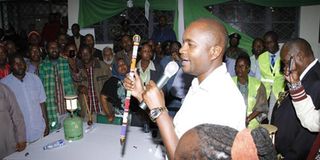Raila scored big in Kajiado, but why were Kenyans so fixated on results?

Newly elected Kajiado Central MP Elijah Memusi makes his victory speech at Maasai Technical Training Institute on March 17, 2015. PHOTO | JEFF ANGOTE |
What you need to know:
- Where this obsession with politics springs from is a mystery.
- Kenyans’ obsession with politics hits them in the pockets.
Raila Odinga was clearly the big winner on Monday night. Retaining a seat in a by-election occasioned by the appointment of a Cabinet secretary in the relatively neutral land of the Maasai was a big victory for the Cord leader.
But here is the question. Why did Kenyans care so much? Why did a by-election of relatively little consequence to wananchi transfix them so dramatically?
You should have seen the tension at a restaurant where I was in just outside the city centre.
People were glued to the screens, consumed in the sort of anxiety one would more normally associate with a father waiting for news from the delivery room.
SEE-SAWING RESULTS
One guy, having witnessed the see-sawing results at an early stage, simply stood up and walked out, saying the tension was too much for him.
Right there, in that restaurant and on social media where people seemed to talk about nothing else for around three hours, you could see the signature peculiarity of Kenyans: Our passionate, obsessive attention to politics.
In England, you are likely to find people in a pub discussing animatedly the fortunes of their sports teams and especially, whether their football team will fall “gloriously” on penalties yet again at the quarter-finals of the next tournament.
Cricket unites the Indians, and they care about socio-economic issues, too. The price of onions can bring down a government, and the last time there was an acute shortage, India’s Farm Minister Sharad Pawar floated tenders for their supply and ordered they should be brought in by plane not sea to hasten their arrival and calm tempers.
In the last few days, a million people have marched in Brazil protesting high-level corruption.
A boda boda guy in Uganda will likely tell you amusing stories about society there. Take a cab in Kenya or go to the barber shop and all you are likely to hear about is politics, politics, politics.
Where this obsession springs from is a mystery. I asked an observer of Kenyan society, and he speculated that it stems from 2003 when Kibaki short-changed Raila and the pair effectively divided Kenyans along lines which remain entrenched and from which no nationalist leader has emerged to heal the divide.
Whatever the cause, this attention to our entertaining but largely inconsequential “high politics” is damaging. It means the political elite hardly have to deliver anything more than keeping the ethnic power barons with whom they will form alliances at the next elections happy.
If the politicians knew that the people might rally in their millions to protest the sort of things the likes of Boniface Mwangi rail about — grand corruption, malfunctioning cancer treatment machines at the main referral hospital, the conditions in low income urban settlements, criminally inefficient land registries across the country, a police force which has turned into one of the biggest extortion cartels in the world — then they might be more attentive to public concerns.
The whole Arab Spring, after all, was triggered by a young man who set himself alight protesting his under-employment, and like the Indians, leaders in the Arab world are eternally vigilant to ensure the price of bread does rise too far and trigger social unrest.
ELECTIONS TRIGGER
Besides, Kenyans’ obsession with politics hits them in the pockets. Elections trigger such anxiety that, as Professor Karuti Kanyinga’s research has shown, economic output, especially farming, goes sharply down every time a major poll looms.
Not just a violent election but any election at all. In fact, the only time there was a dip in economic growth rates in the first Kibaki term was in 2005 as business people and farmers held their counsel waiting to see what would happen during the referendum on the constitution.
Kenyans need to learn to be more relaxed about the political fortunes of their national leaders and to be more focused on demanding clean and efficient government.
Cord scored a big win in Kajiado, certainly. But one pines for the day when wananchi will be more concerned about their welfare and not monitor relatively inconsequential political contests with the mind-numbing anxiety of fans watching a penalty shoot-out in a cup final or of a condemned man awaiting his execution.





